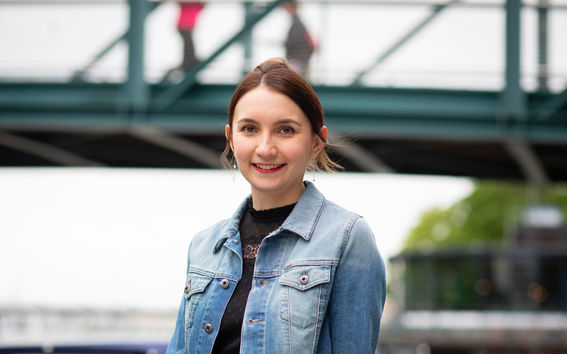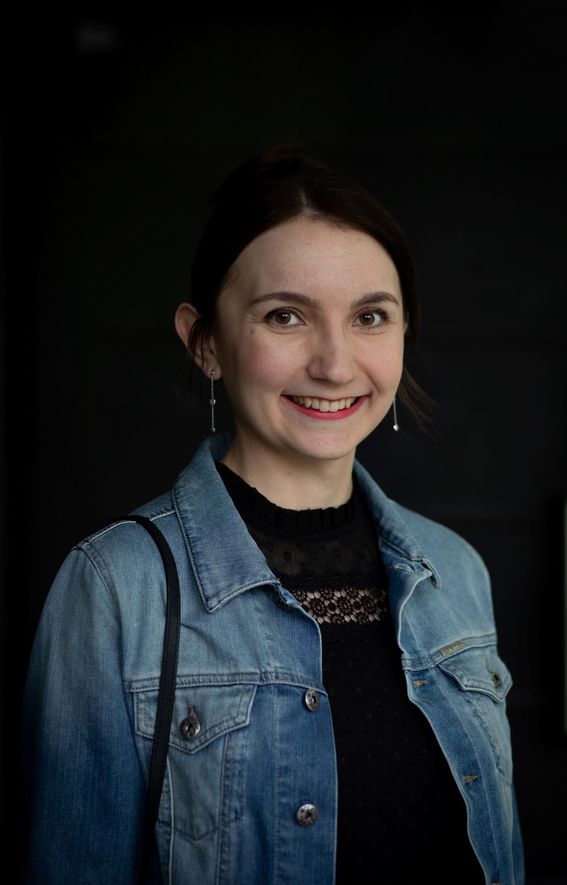Anna Cichonska uses data science to develop better healthcare

Dr. Anna Cichonska, alumna of Aalto University and Senior Data Scientist, knows how data science can help us develop better healthcare and drug therapy. During her doctoral studies at Aalto, Cichonska and her colleagues developed novel machine learning-based methods that make predicting patient responses to drug therapies easier and help identify the contribution of the variation in a DNA sequence of individuals to their risk of developing diseases. In her current job, Cichonska helps to develop preventive medicine.
These days, researchers conduct a lot of genetic research and they have access to enormous amounts of data from all over the world. However, most studies investigating the impact of genetic variants on different diseases seek to detect a link only between a single genetic variant and a single disease trait at a time. Often, sample sizes in these studies are modest and researchers have no access to the original data from other studies for the joint analysis. Therefore, individual studies explain only a small proportion of why diseases manifest themselves in different ways in different people. If more genetic variants and traits were studied together, more discoveries could be made, but this type of research is slow and laborious to do with the use of traditional methods.
The model developed by Cichonska and her colleagues helps to identify novel insights from published standard research results. In practice, if a single study has found, for example, an association between a particular genetic variant and type 2 diabetes, the model can test other genetic variants from several studies simultaneously and identify whether they are also related to the disease.
The new model does this quickly and using little data. Therefore, it can make a significant contribution to the development of new and more individualized drug therapies. ‘Machine learning methods can really help us to gain valuable information about the biology of the disease,’ Dr. Cichonska sums up.
Anna CichonskaMachine learning methods can really help us to gain valuable information about the biology of the disease
In 2019, she received a dissertation award from the Aalto University School of Science for her work. In May 2020, the Finnish Society for Bioinformatics awarded her dissertation as the best dissertation done in 2018–2019 in the field in Finland. According to the society, it awarded the prize to Cichonska because her work had such a major impact on systems pharmacology. ‘When I heard about the award, I couldn’t believe it. I was so happy and surprised at the same time. They only chose one dissertation from the whole Finland, so it was a great honor.’
Two good reasons to move to Finland
Cichonska originally comes from Poland but she moved to Finland almost eight years ago. As a child, she liked school but also many other things. ‘I liked sports and different activities. I played volleyball and table tennis and enjoyed being outdoors with my friends.’
Math was her favorite subject. ‘Doing math homework didn’t feel like doing homework. It was really fun. That is why I later decided to study bioinformatics, where I can apply mathematics to solve important problems in biology and medicine.’
Cichonska became more interested in research at the end of her bachelor's studies. For her bachelor’s thesis, she studied genes that manifest in different ways in colon cancer. The project included not only laboratory work but also conducting computational analyzes, which seemed interesting. ‘My instructor suggested that we present my work at a large scientific conference that happened to be held in Poland that year, where I got to meet a lot of researchers from all around the world. At this point, I wasn’t yet thinking about pursuing doctoral studies, but I found it all very interesting.’
Cichonska went to Italy as an exchange student where she met her current boyfriend who is from Finland. After finishing her master’s degree, she received an interesting job offer from Poland and at first did not consider moving abroad – until she heard about Aalto and FIMM’s joint doctoral position, which seemed intriguing. She applied for the competed position, and to her surprise, got the job. ‘Then I had two reasons to move to Finland – my boyfriend and the job – so I did.’
But what made her do such groundbreaking and successful work during her doctoral studies? According to her, one important reason was the interdisciplinary nature of the work combined with the stimulating research environment at Aalto and FIMM. ‘I worked with several people from different backgrounds, at two institutions, and in different research groups. It was very diverse – computer science combined with genetics and drug development. Of course, it also required a lot of work, but it wouldn’t have been possible without the people who supported me,’ Cichonska says.
Anna CichonskaAt the moment, our healthcare system treats sick people, so we want to help it by focusing on preventing diseases.
Doctoral studies last for years, so she thinks it is important for doctoral researchers to make sure that they can maintain interest in the topic and stay optimistic. ‘There are failures along the way. They are part of academic research. It is important not to give up.’ The dissertation is not your whole life, she recalls. She found balance between work and leisure through yoga and exercise; hobbies brought new perspective and helped recharge batteries.
Work for preventive healthcare
Cichonska’s first winter in Finland was a bit of a shock, as it was a very long, cold and snowy one. She said to her boyfriend repeatedly that she would not want to stay permanently in Finland. After completing her dissertation, however, she got a job at Nightingale Health – and that was just what she wanted to do. ‘Things change – I still don't like winter, but also my home and friends are here now.’
Nightingale aims to build a new ‘health-creation’ system that is designed to abolish chronic diseases by predicting, preventing and averting them. Nightingale developed an innovative blood test that measures over 250 metabolic biomarkers from a single blood sample, and provides a comprehensive view of an individual’s overall health. ‘Nightingale’s metabolic biomarkers can e.g. identify individuals at high risk of developing diseases or health problems, such as heart attacks. At the moment, our healthcare system treats sick people, so we want to help it by focusing on preventing diseases.’
Nightingale collaborates with two Japanese companies to take their model of preventive healthcare to Japan, a country that has the largest proportion of elderly people in the whole world. The Japanese people are also very cautious about health, says Cichonska who was supposed to move to Japan for some time in spring 2020. The Covid-19 pandemic postponed her relocation, however.
Cichonska seems to be very excited about different projects Nightingale is involved in and she enjoys working in an environment where she can apply the scientific methods coming from the academic world. She hopes to work towards advancing medicine and healthcare also in the future and continue working with different kinds of people with different types of expertise. Cichonska believes that, at least in her case, doctoral studies helped her get to the point where she is now. ‘Doctoral studies are useful because they give you more substance knowledge and you learn different techniques really in depth. From my point of view, it has all been very useful.’

Anna Cichonska, Senior Data Scientist
Works at Nightingale Health
Education: Doctor of Science in Technology from Aalto University
Lives in Helsinki
Hails from Bytom, Poland
The greatest professional achievement: ‘My dissertation. Cooperation with smart and driven people and years of hard work took me here and led to the fact that my thesis has been awarded.’
Has also
Missed airports during the Covid-19 pandemic. ‘I love to travel, and to me, being at the airport often means traveling to conferences and meeting my family.’
Lived in Greece and learned to speak Greek. ‘As a student, I had a summer job in Greece and worked as a barmaid at a hotel on the island of Evia.’
Read more news

Apply Now: Unite! Visiting Professorships at TU Graz
TU Graz, Austria, invites experienced postdoctoral researchers to apply for two fully funded visiting professorships. The deadline for expressions of interest is 20 February 2026, and the positions will begin on 1 October 2026.Soil Laboratory Exhibition – Exploring the Dialogue Between Human and the Earth in Utsjoki
Soil Laboratory explores the relationship between humans and the earth as a living landscape through ceramic practices in Utsjoki.
The Finnish Cultural Foundation awarded grants for science and art
A total of 15 individuals or groups from Aalto University received grants






